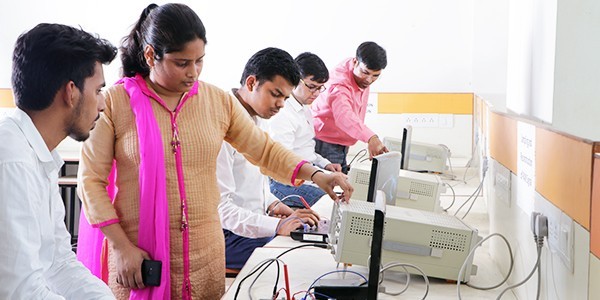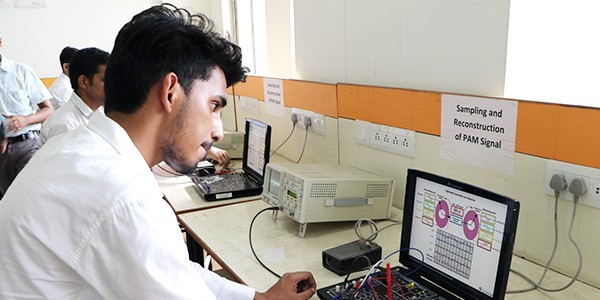M. Tech – Wireless Communication & Sensor Network
Educational Objectives
The ability to communicate in a very sophisticated manner is one of the few unique traits which declares human supremacy amongst other beings, and in the past few decades, with the invention of internet and other major developments in the wireless communication division, the level of communication, and connection, amongst humans throughout the globe has improved significantly. But, dealing with various methods of communication requires knowledge of various technologies including electronics, IT, computer sciences, etc.
BBDU which has the best M.Tech. college in Lucknow, provides an M.Tech. stream in Wireless Communication & Sensor Networking for an in-depth study of the existing technologies for wireless communication, including satellite and MIMO technologies, remote sensing technologies, study of sensor networks etc.
But, for the proper development and growth of the student into a truly capable Wireless Communications engineer, BBDU-the Wireless Communication & Sensor Networking college in Lucknow, tries to meet the following objectives in terms of education:
- Provision of unlimited reading materials, both national and international
- Provision of top-of-the-line faculty members for sound learning
- Pertinent practical learning of concepts and related applications
- Compulsory trainings and/or projects/thesis for real time learning and problem solving
Opportunities For Wireless Communication & Sensor Network Engineers
A very obvious fact is that, the way things are progressing, the demand for communication technologies is only going to increase. Moreover, as time passes, we will be requiring more advanced and subtler versions of the existing technologies, especially with sensor networking having so much scope of enhancement.
Thus, a job and research, are both available choices.
While research in such a field would never face dead-ends and is especially fruitful if the individual is able to get a chance in government projects, jobs have a huge advantage with the fact that such knowledge can be applied in a vast array of fields/disciplines.
A few usual jobs offered in this line of study are:
- RF Engineer
- Technical Engineer
- Network Engineer
- Research Scholar
- Firmware Engineer
- Professor
- Software Development Engineer
- Maintenance Engineer
Program Outcomes
- Engineering Knowledge: Apply the knowledge of mathematics, science, engineering fundamentals and an engineering specialization to the solution of complex engineering problems.
- Problem Analysis: Identify, formulate, review literature and analyze complex engineering problems reaching substantiated conclusions using first principles of mathematics, natural science and engineering sciences.
- Design / Development of Solutions: Design solutions for complex engineering problems and design system components or processes that meet the specified needs with appropriate consideration for the public health and safety and the cultural, societal and environmental considerations .
- Conduct Investigations of Complex problems: Use research based knowledge and research methods including design of experiments, analysis and interpretation of data, and synthesis of the information to provide valid conclusions.
- Modern Tool Usage: Create, Select, and apply appropriate techniques, resources and modern engineering and IT tools including prediction and modeling to complex engineering activities with an understanding of the limitations .
- The Engineer and Society: Apply reasoning informed by the contextual knowledge to assess societal, health, safety, legal and cultural issues and the consequent responsibilities relevant to the professional engineering practice.
- Environment and Sustainability: Understand the impact of the professional engineering solutions in societal and environmental context and demonstrate the knowledge of , and need for sustainable development.
- Ethics: Apply ethical principles and commit to professional ethics and responsibilities and norms of the engineering practice.
- Individual and Team Work: Function effectively as an individual and as a member or leader in diverse teams and in multidisciplinary settings.
- Communication: Communicate effectively with the engineering community and with society at large. Be able to comprehend and write effective reports documentation. Make effective presentations, and give and receive clear instructions.
- Project management and finance: Demonstrate knowledge and understanding of engineering and management principles and apply these to one’s own work, as a member and leader in a team. Manage projects in multidisciplinary environments.
- Life-long learning: Recognize the need for, and have the preparation and ability to engage in independent and life- long learning in the broadest context of technological change.
Program Specific Outcomes
- An ability to design and analyze the concepts and applications in the field of communication/ networking, signal processing, Sensor Network, Cognitive radio etc.. Along with comprehend the technological advancements in the usage of modern design tools to analyze and design subsystems/processes for a variety of applications.
- An ability to communicate in both oral and written forms, the work already done and the future plans with necessary road maps, demonstrating the practice of professional ethics and the concerns for social and environmental impact.
Syllabus
Apply Now
Error: Contact form not found.
Engineering Courses
Labs
- Digital Electronics Lab
- Advance Analog Circuit Lab
- PCB Lab
- Microprocessors Lab
- Communication Lab
- Digital Signal Processing Lab
- Microwave Lab
- MIMO Wireless Communication Lab







